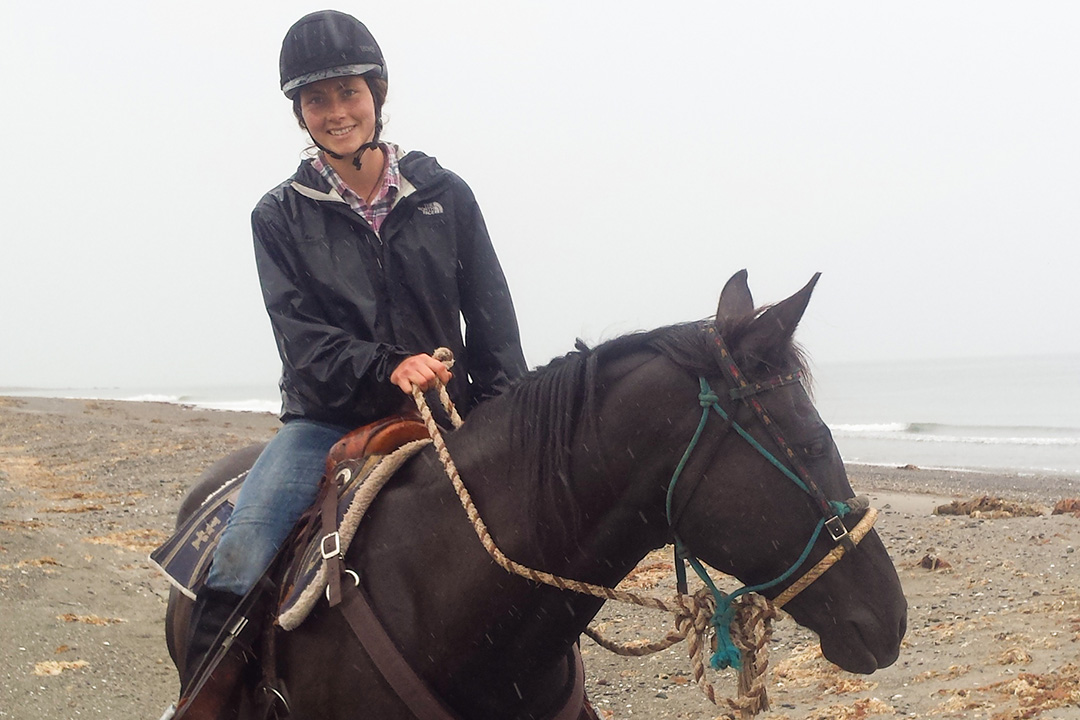
New veterinarian to pursue her dream in New Zealand
Nearly a year ago, Dr. Reina Fennell (DVM) recalls looking down at a discharge sheet—her first patient, the first case of her first clinical rotation in her final year at the Western College of Veterinary Medicine (WCVM) on the University of Saskatchewan (USask) campus.
By Lynne Gunville“I remember looking at my name printed on the bottom of the discharge as I handed it to the client,” said Fennell. “I thought, ‘Oh gosh! I’m like almost a veterinarian!’ That was the first time it suddenly felt real—a dream 24 years in the making, and all of a sudden I was nearly there.”
From the time Fennell was a “wild, outdoorsy, animal-loving kid” growing up on Haida Gwaii in British Columbia, she has dreamed of becoming a veterinarian. She kept a menagerie of pets that included chickens, ducks and lizards, and her treasured horse Shadow.
Now that Fennell is officially a practitioner after graduating, she’s looking forward to the next phase of her dream—a one-year internship at Veterinary Associates Equine in New Zealand. As a rotating intern at the general and referral practice near Auckland, N.Z., Fennell will spend her first six months working in specialities including anesthesia, surgery, internal medicine, reproduction and lameness.
“By the second half of the year we work as largely an independent practitioner, but always with a support system of people to round with or to call for advice,” Fennell explained. “They seek to develop a proficient, high-quality equine veterinarian who will do well in a private practice or a residency.”
Fennell anticipates a diverse caseload—a product of New Zealand’s unique equine culture that has veterinarians working with “everything from a Grand Prix jumper to a hobby farmer’s pet donkey in the same day.”
Having already spent six months volunteering on New Zealand farms, Fennel feels an affinity with the people and the culture of a country that’s reminiscent of Haida Gwaii, the chain of islands off the B.C. coast where she grew up.
“It’s like a much bigger Haida Gwaii; the culture is very similar,” Fennell said. “Kiwis work to live, not live to work, and although I’m passionate about this career, I want to find some sort of work-life balance. I think the New Zealand way of life will facilitate that.”
While Fennell remembers the challenges of vet school, she also has many positive memories of student life. She particularly appreciates the friendships and the activities that included walks between classes, game nights, dance nights, cinema Fridays, camping and hiking trips and “family” dinners on holidays away from home.
“My friends got me through my DVM [program]. I love my whole class, but having people you become really close to is critical to staying positive and happy amidst the challenges of this program. We had a lot of fun despite our extremely cramped schedules,” said Fennell. “All of those times stand out for me far more than the countless nights and weekends of studying. They were really worth fitting in.”
Fennell also appreciates the encouragement she received from WCVM faculty members such as beef cattle specialist Dr. John Campbell (DVM, DVSc) and veterinary pathologist Dr. Bruce Wobeser (DVM, PhD). Dr. Tiago Afonso’s (DVM, PhD) equine medicine lectures were favourites for Fennell, and she greatly valued his help with securing the New Zealand internship.
Fennell’s summer work experiences were valuable opportunities for her to take a break from classes while developing and practising her clinical skills. She particularly enjoyed her first clinic job at Kamloops Large Animal Clinic in interior B.C.
“I lived in a tiny camper trailer in a field that summer with my horse Shadow in the field,” said Fennell. “He’d bump his nose against my window in the morning to wake me up … I loved going on calls with the vets all over the valley and neighbouring valleys. I was introduced to routine beef cattle work, equine dentistry and some minor equine surgery as well as equine ambulatory emergency and some in-hospital critical care stuff.”
As Fennell prepares for her New Zealand internship, she looks forward to developing competency with a variety of horses and medical issues while honing her clinical problem-solving skills.
“I enjoy every part of ambulatory work, from chatting in the truck with clinicians to visiting people and their animals on farms,” said Fennell. “I like just being outside and the physicality of working with large animals in a variety of circumstances.”

